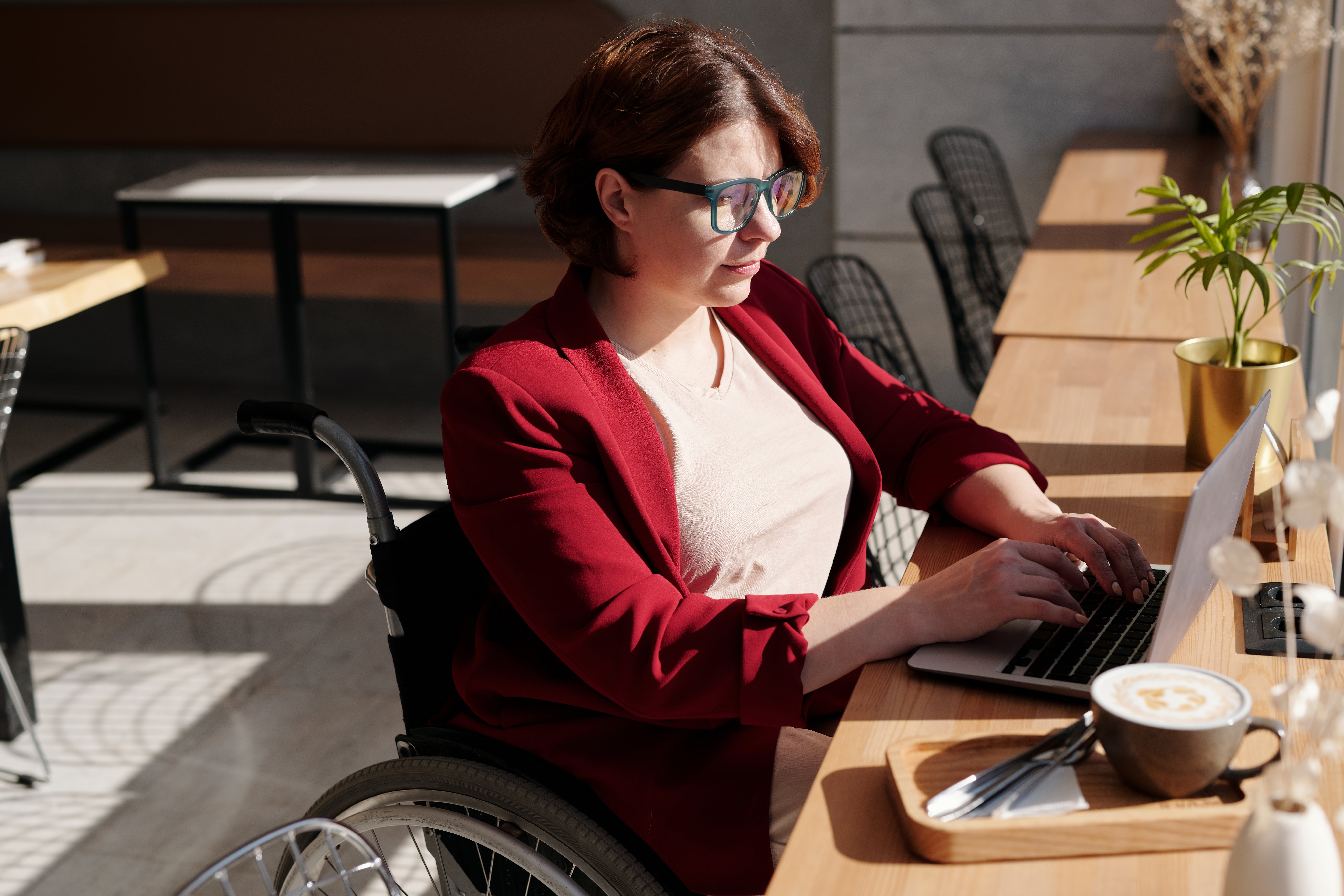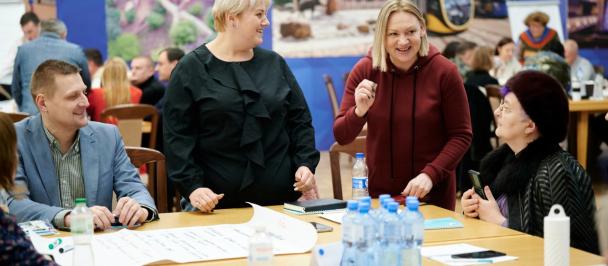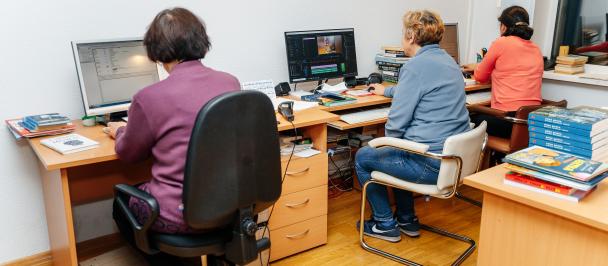Grant Competition: Enhancing Employment and Self-Employment Opportunities for People with Disabilities in Vinnytsia, Dnipropetrovsk, Lviv, Kyiv oblasts, and the city of Kyiv
November 16, 2023

1. Background
The Russian Federation’s war on Ukraine has caused widespread death, destruction, displacement and human suffering, and left at least 17.6 million people in need of multisectoral humanitarian assistance in 2023. This includes 6.3 million internally displaced people, 4.4 million returnees and 6.9 million people who have remained at their homes throughout the war[1]. Massive destruction of infrastructure has decimated essential services, and left people without their homes or livelihoods. Needs are multisectoral in nature, and gender and diversity factors – in particular age, disability and minority status – play a key role in determining how people are impacted by the war.
The scope and scale of damage to critical infrastructure caused by the conflict has also been devastating, including residential housing, hospitals, schools, kindergartens, and other civilian targets damaged or destroyed. The number of people with disabilities (PwDs) caused by the war – both combatants and civilians - has led to increased special demands on services, specifically medical and psycho-social, which are expected to continue to grow substantially over time[2]. The Government of Ukraine has a wide set of policies regulating the sphere of social and medical services and a wide range of rehabilitation centers, nevertheless, the rehabilitation system lacks capacities, funds and is in dire need of modernization and face difficulties in terms of dealing with war inflicted injuries and traumas.
PwDs are particularly vulnerable in this dire situation of war and, experience poorer health. People with disabilities also experience inequalities on a number of other socio-economic measures, as they are more likely than those who do not have a disability to experience poverty, violence, social exclusion, housing insecurity, and have less opportunity to engage in meaningful work. Persons with disabilities in Ukraine were already vulnerable before the war broke out, however since the start of the invasion, they are experiencing multiple barriers and immense difficulties to flee the conflict-affected areas, resulting in risks to their lives, and many struggle to meet daily needs and challenges in accessing humanitarian assistance.
Around the world, people with disabilities make significant contributions to their national economies and to society as productive employees, self-employed workers and entrepreneurs in various sectors. People with disabilities can perform most jobs, be productive and engage in successful business enterprises when there is a conducive environment. Workforce diversity, also in relation to disability, has well-documented benefits for organizational performance, improving decision-making, boosting innovation and fostering staff loyalty. Yet, in both developed and developing economies, working-age people with disabilities continue to experience a wide range of challenges in accessing economic opportunities, including physical and lack of information.[3]
PwDs represent a higher percent of people without employment comparing with persons without disabilities,[4] which show the interrelation between disability and poverty and the need to intervene urgently for increased support to PWDs’ employability, to ensure their sustainable access to livelihoods. Many of these pre-existing challenges for PwDs’ economic integration, which among others include inaccessible professional education and working infrastructure and processes, skills deficit, recruitment-related discrimination, which constrains entrepreneurial opportunities and limits access to business support services and resources, which have been significantly aggravated by the war. People with disability as an effect of the war, need support with job placement, job place accommodation (taking into account their impairments) and social support for adaptation on the workplace.
Employment for people with disabilities is important for many reasons: raising the standard of living, socialization in society, and improving their psychological state. Increasing and maintaining the employment of people with disabilities is important not only for them, but also for employers and society as a whole. Combining the efforts of the private sector, civil society, and government institutions to create joint public-private partnership initiatives can enhance the competitiveness of people with disabilities in the labor market.
This Call for Proposals (CpF) aims at supporting initiatives that will help to establish or foster Public-Private Partnerships (PPP) focused on the improvement of the livelihoods and economic and social integration of PwDs’ caused by the war as well as at engaging PwDs to self-employment and entrepreneurship through training and startup support activities.
This announcement informs about the procedure for submitting project proposals, eligibility and selection criteria, timing, reporting requirements, and other information on the Grants contest.
2. OBJECTIVES OF THE COMPETITION:
UNDP implements an international technical assistance Project “Support rehabilitation of People with Disabilities with injuries caused by the war”, aimed to communities, including vulnerable people and IDPs, are more resilient and equitably benefit from greater social cohesion, quality services and recovery support.
Through this Call for Proposals, UNDP would like to engage civil society organizations to apply for two thematic areas:
Lot 1
Support livelihood public-private partnership initiatives aimed at improvement of socio-economic integration of PwDs and support to their employability in Vinnytsia, Dnipropetrovsk, Lviv, Kyiv oblasts and Kyiv city. Such initiatives include community initiatives to deliver professional training based on vocational education institutions and on-the-job training in local workshops, paid internship, additional support to promote job placement or self-employment opportunities, including raising motivation for entrepreneurial activities and social enterprise development and promotion of equal and indiscriminatory recruitment among employers.
Project proposals prepared and submitted for this competition should help to create or improve employment opportunities for PwD in the target areas through public-private partnership initiatives. Projects should offer realistic and well-thought-out activities in the field of cooperation with public institutions providing support on PwDs employment or job opportunities (State Employment Service or any other relevant organizations), raise awareness of PwD in target areas about employment opportunities, create tools for efficient cooperation between stakeholders (VET institutions, employers, SES, local authorities, employers' associations, etc.).
The projects submitted within this grant program should improve employability of persons with disabilities/ with injuries caused by the war through on-the-job training, internship, support to job placement and adaptation on workplace, creation of inclusive working environment etc. Examples of such activities that based on public-private partnership may include (but are not limited to):
- Proposing ways to support skills development, re-training and mentorship programs for people with disabilities.
- Enhancement of vocational education and training system capacity to ensure inclusiveness and relevance of the educational process including for adults.
- Proposing ways to support initiatives, aimed at the improvement of employability and livelihoods of people with disabilities from job search to job placement and onboarding, paid internship, creation of an inclusive working environment, and promotion of equal and nondiscriminatory recruitment among employers.
- Conducting an advocacy campaign, producing and disseminating content, informational and motivational materials that inform about the benefits, combat relevant stereotypes and otherwise contribute to the employment of PwDs.
Lot 2
Support creating or improving employment and self-employment opportunities for People with Disabilities in Vinnytsia, Dnipropetrovsk, Lviv, Kyiv oblasts, and Kyiv city.
Such initiatives include engaging PwDs in self-employment and entrepreneurship through training and startup support activities.
Projects should offer realistic and well-thought-out activities in the field of providing support to PwDs in self-employment or starting business, raising awareness of PwD in target areas about self-employment opportunities, creating tools for efficient economic integration of PwDs, etc.
The projects submitted within Lot 2 should improve the self-employability of persons with disabilities/injuries caused by the war through business skills training, mentorship programs, support to business creation and running, creation of an inclusive business environment, etc. Such projects may include the following activities (but are not limited to):
- Proposing ways to support business skills development of PwD (both soft and hard ones).
- Promotion of entrepreneurship among PwDs.
- Proposing ways to support business initiatives of PwDs (including providing on-kind grant support, etc.)
- Conducting an advocacy campaign, producing and disseminating content, informational and motivational materials that inform about the benefits, combat relevant stereotypes, and otherwise contribute to self-employment or running a business by PwDs.
3. REQUIREMENTS FOR PARTICIPANTS OF THE CONTEST AND TERRITORY OF THE CONTEST
3.1. Public and charitable organizations, unions and associations operating in the territory of Vinnytsia, Dnipropetrovsk, Lviv, Kyiv oblasts and Kyiv city.
In order to apply for a grant an organization should:
- be an officially registered legal entity with the status of a non-profit or charitable organization (have non-profit codes 0032, 0034, 0036, 0038, 0039, 0044, 0045, 0046, 0047, 0048 or fall under the Law of Ukraine “On Chambers of Commerce and Industry in Ukraine”);
- be ready and have a confirmed organizational, technical and personnel capacity to develop, organize and implement activities throughout the project implementation area stated in the project proposal submitted for the competition;
- to adhere to innovation in their activities, to be aimed at promoting the achievement of sustainable development goals, to follow to a gender-oriented approach and the principles of zero discrimination;
- the parameters that will determine whether an CSO/NGOs is eligible to be considered for funding by UNDP will be based on the Capacity Assessment Checklist CACHE (Annex 5).
- the partnership of a non-profit organization with a public and private institution must be documented by a letter of partnership, memorandum, letter of commitment to implement the project or other document that clearly shows the intention of cooperation, awareness of all parties with the content of project proposal and division of responsibilities between partners.
- Associations and unions of entrepreneurs and business associations can act as applicants for this CfP (as they meet all the requirements) and, at the same time, represent employers.
Applications sent from individuals, commercial organizations, government agencies and organizations, local governments, trade unions, political parties, religious organizations will not be considered.
3.2. Territory of the grant projects implementation:
Vinnytsia, Dnipropetrovsk, Lviv, Kyiv oblasts and Kyiv city.
3.3. Requirements for the project staff:
- project team should at least consist of: Project Manager (responsible for the overall coordination of the project implementation and the submission of relevant reports of UNDP) and Accountant (responsible for accounting and financial reporting);
- project team may also include other persons directly involved in the implementation of the project;
- for the Project Manager, higher education or specialized postgraduate vocational education in the target areas of the project and/or project management is desirable, fluency in Ukrainian is required;
- accountant must have a relevant certified education/training, and in accounting for at least two years;
- for other team members – not less than experience in the relevant sector from one year;
- the application should include CVs of the project team and, if the staff is being hired during the implementation, the key requirements to such staff. The candidacies of the project team members will be finally approved by UNDP if the project proposal is supported in accordance with their qualifications and work experience.
- If the recruitment of specialists is only envisaged when the project proposal is supported, the key requirements to such team members should be indicated in the narrative part of the application form (profile education, work experience, etc.). Programs of training, research, and other activities to which specialists are planned should also be presented. Candidates for project team members should be submitted to UNDP for approval if the grant is awarded.
The personnel involved in the implementation of the project must demonstrate readiness to conform to UNDP rules and regulations.
4. PROJECT DURATION
It is expected that the duration of the proposed projects will not exceed two months.
The deadline for submitting project proposals is November 24, 2023, 23:59.
The project implementation will start no later than December 1, 2023.
The project implementation will end no later than January 25, 2024.
5. BUDGET AND ALLOWED EXPENSES:
It is expected that each of the winning project proposals will be funded an average of USD 10,000 in UAH equivalent.
Eligible costs must:
- be necessary for caring out project activities;
- have been incurred by the applicant during the implementation period;
- comply with the principles of sound financial management, in particular, value for money and cost-effectiveness;
- be adequately recorded, identifiable and verifiable, and be backed by original supporting documents.
UNDP grant may only be used to cover the following costs:
- staff salaries (up to 10% of total budget) and expert fees;
- communication and information services;
- purchase of consultative services and contracts provided that these are essential to project goals and objectives;
- procurement of equipment;
- renting, catering, and other services envisaged by the project activities;
- printing and copying;
- utility services;
- consumables and supplies;
- transportation and other costs associated with project activities;
Not more than 30% of the grant funds may be spent of equipment, provided a clear justification is offered as to its need to achieve project goals.
The following costs are ineligible:
- developing of a project proposal for participation in the contest;
- academic research;
- payment of debts;
- reimbursement of exchange rate fluctuations;
- business trips along Ukraine that were not agreed in the project proposal at the beginning of the project and international business trips;
- office rent and utility bills;
- costs for the implementation of other projects/works outside the objectives of this project;
- currency exchange losses.
6. PROCEDURE FOR SUBMITTING PROJECT PROPOSALS AND RECEIVING CONSULTATIONS IN THE PREPARATION OF PROJECT PROPOSALS
The application package consists of the following:
Online application form, filled in online with a link Application Form containing basic information about the organization and the project proposal.
- Full application form (filled in MS Word format), which describes the organizational plan, project implementation plan, prospective activities, etc. (*.docx/*.doc).
- Financial proposal (proposed budget in Excel format).
- Current electronic copies of the following documents (issued no earlier than 2020, file *.PDF, *.JPG):
- certificate of registration or extract;
- a certificate from the tax inspectorate on the inclusion of the organization in the Register of non-profit organizations indicating the non-profit code;
- certificate from the bank on opening an account;
- brief provisions of the development strategy for the next 2-3 years or electronic links to these documents, if any.
- documentary confirmation of partnership (memorandum, partnership letters or other).
- Completed Request for Information (RFI) form.
- Letter of consent to data processing.
- Capacity Assessment Checklist (CACHE) for CSO/NGO
The full application package (paragraphs 1-6 and online application form) must be submitted by 23:59 on November 24, 2023:
- the full application form (paragraph 1), financial proposals (paragraph 2), and other documents in paragraphs 3-6 must be sent by one letter in the archive (*.rar/*.zip) the size of which should not exceed 15 Mb to the e-mail address grants.ua@undp.org with the subject of the message: UNDP_1_2023_PPP_Grant Call;
- online application form filled in online with a link Application Form
Project proposals received after the deadline specified in the announced period for any reason will not be considered.
The received project proposals will be checked for compliance with the requirements of the competition, and those that meet the requirements will be submitted to the Grant Selection Committee (GSC) for consideration.
UNDP reserves the right to clarify the applications submitted, request for additional documents of improved quality. If the project proposal is received in time, which allows making a clarification, such request for revision will be made to the participant of the Contest.
To provide answers to questions that may arise during the preparation of project proposals for this Call, remote consultations will be held on November 17, 2023, and November 21, 2023. Registration by link
The results of the consideration of the applications will be notified to the participants after review by the Selection Committee.
Note!
Materials submitted to the competition are not returned or reviewed.
Participants will be notified of the results of the competitions by e-mail.
The final decision on the project or application is not subject to review.
The reasons for rejecting or supporting the project will not be communicated.
7. EVALUATION OF PROJECT PROPOSALS
UNDP specialists will review the project concepts submitted for the stage I of the competition and select organizations which will be invited to submit finalized project proposals.
The project proposals submitted for stage II – Submission of the project proposals will be checked against the criteria for the assessment of proposals. At this stage, the Programme can request additional information from the applicants at its own discretion.
To ensure full transparency and equity of the process, UNDP forms a Grant Selection Committee (GSC) that will appraise the proposals that have made it through the first stage. GSC is a temporary authorized body that is responsible for considering, selecting and recommending proposals for funding. The Grant Selection Committee may decide to request additional independent expert opinion during the selection process.
The Selection Committee will consist of representatives of UNDP in accordance with their key areas of work and the experts involved. At the same time, the Selection Committee has the right to seek independent expert opinion during the selection of project proposals or the opinion of local authorities in whose territory the project activity is envisaged.
The proposals shall be assessed by the GSC in accordance to the following criteria:
| Generalized form of evaluation of the technical proposal | Maximum score | |
| 1. | Responsiveness of the LVG project proposal to the core theme of the CFP | 25 |
| 2. | Ability of the proposed LVG project team (staff and proposed consultants) to cope with the scope of works described in the project proposal | 20 |
| 33. | Quality of the proposed networks and instruments for result dissemination | 10 |
| 4. | Demonstrated experience in providing services to PWDs | 15 |
| 55. | Demonstrated sustainability considerations of the project | 10 |
| 66. | Quality and realistic nature of the budget proposal | 20 |
| Total score | 100 | |
| Notes |
8. REPORTING, MONITORING AND EVALUATION OF GRANT PROJECTS
Monitoring and evaluation
The grant recipient is responsible for actual monitoring of the implementation of the project and evaluating of its results. The United Nations Development Program will monitor the implementation and validation of the results and quality of implementation of the grant project through the reports of the grant recipient, meetings with project staff, their partners and beneficiaries, as well as through participation in project activities.
Reporting
The grant recipient will submit reports in the format defined by the United Nations Development Programme:
- short on-demand reports, which may be required from time to time by UNDP when information on the grant project is required;
- a final report, which will include a description of the activities and results, as well as a financial report for the entire period of the grant agreement with primary financial documents and a bank statement confirming the fulfilment of financial obligations for the entire period of the project.
9. FUNDING
The grantee organization will receive the payment for the planned activities under the grant agreement in the amount of 100% split in two parts. The second tranche will be transferred upon submission and acceptance of the final report. The total amount of the advance payment will be specified in the grant agreement.
ANNEXES
- Annex 1. Application form template
- Annex 2. Template of Financial proposal
- Annex 3. Template of Request for Information form
- Annex 4. Letter of Consent for the processing of personal data
- Annex 5. Capacity Assessment Checklist (CACHE) For CSO/NGO
[1] Ukraine Humanitarian Needs Overview 2023
[2] https://humanity-inclusion.org.uk/en/news/ukraine-hi-cares-for-patients-wounded-by-war
[3] EBRD_Report_Economic inclusion for people with disabilities.pdf

 Locations
Locations



